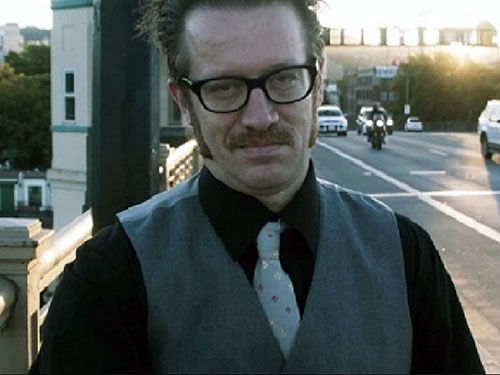Jamie S. Rich is one of the upcoming panelists for Ooligan Press event Write to Publish. As a writer, editor, and publisher of comics, Jamie has a lot of insight to offer in the realm of publishing comics—so much so that he’s even started his own YouTube series, From the Gutters, dedicated to demystifying comics and their creators. Here, Jamie answers a few questions about himself and the world of comics.
What got you into publishing comics?
I began, like many, as a fan. It was back in the pre-Internet days, so to be an engaged part of fandom took some doing. I wrote to comic book letters columns and went to conventions. My intention was always to be a writer, and I went to school as an English/creative writing major, which should surprise no one to hear isn’t entirely practical. I wasn’t sure what I was going to do straight away. I had a vague fantasy that I was going to live like the characters on the old Route 66 TV show and travel the country in search of stories. Instead, I was offered a gig in the editorial department at Dark Horse Comics.
What is the one thing you wish you had known sooner about publishing that might have eased the way in your career?
That even though you have to sweat the small stuff, when something slips by, it’s not the end of the world. The devil certainly is in the details, and we must be ever vigilant in getting everything right, but at the same time, perfect is impossible, and for every typo or whatever that slips through, you have to remember the thousands of things you got right. And then swear never to make the same mistake again.
What are some of the most common mistakes you see from authors seeking publication in the comics industry?
The main one is a lack of work to back up your intentions. You need to sit down and write that comic book before you’re likely to find someone willing to publish it, much less draw it.
How do you think the Internet has affected publishing in the realm of comics?
Like a lot of media, it’s granted more people access to the material, and given would-be creators more gateways to release their work. Anyone can do a webcomic. You don’t need to spend a ton of money on printing or find a publisher to get started.
How do you think the Internet will continue to affect comic book publishing?
I think the idea that you can create your own platform for publishing will continue to grow. There have been some very successful models for individuals self-publishing in recent years, from a more traditional mini-comic method to bypassing all traditional routes and selling DRM-free digital files through a dedicated storefront. Becky Cloonan self-published and shipped thousands of her mini-comics and has won an Eisner Award for them—all on her own, all before she even put the material up on Comixology for download—whereas Brian K. Vaughan and Marcos Martin have yet to print an issue of The Private Eye and yet are seeing huge numbers via their pay-what-you-will digital model.
Where do you feel things such as From the Gutters fit in the publishing world?
Having been on the promotional treadmill myself fairly often, it starts to feel dehumanizing. You’re just filling in the blanks with a lot of snake oil, and there isn’t a lot of personality to how writers and artists and editors are engaged by the audience or the media, or even how they engage their own work. We wanted to show that your favorite comic book creator is an actual person with a history and funny stories, and at the same time, demystify the work process a little bit.
What do you look at in a piece when deciding whether you want to publish it or not?
I really only have two criteria, and it’s the same criteria I have as a reader: have you executed the work with a certain level of skill and are you communicating something to me. If both are there, you’re probably communicating exactly what you intended and doing it well.
What is some advice you would give to someone seeking publication in this day and age?
Don’t wait for anyone to give you the go-ahead. You need to get started on your own, because no one is going to open up the door on any secret yellow brick road. Likewise, you’re the only one who can tell you when to stop.

